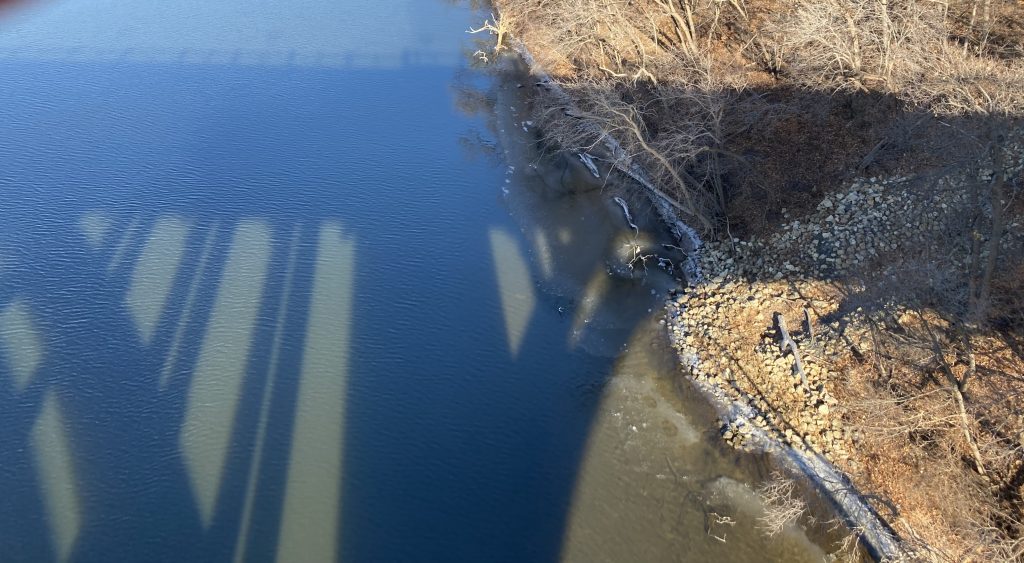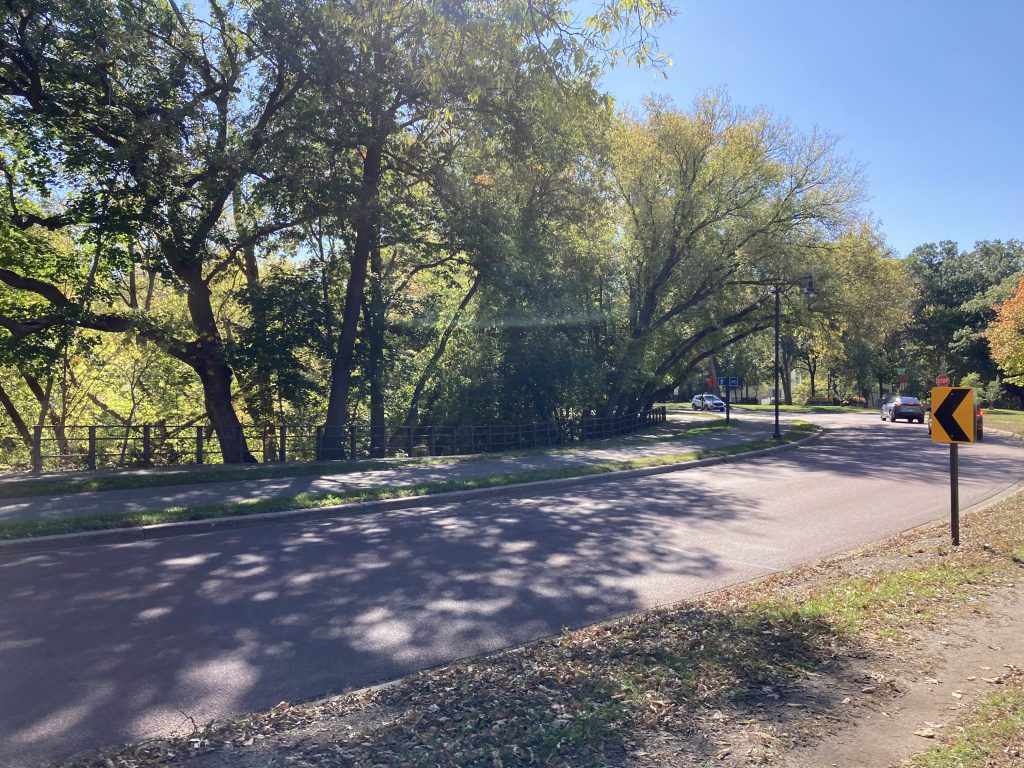walk: 45 minues
neighborhood, with Delia the dog
30 degrees
Took Delia out for a walk around the neighborhood. North, then east past Cooper School and the giant mounds of snow plowed somewhere else then deposited on this field. Past the house that had been half-finished then abandoned a few years ago and is now finished and on the market for almost $900,000. Past the new Minnehaha Academy, which replaced the old one that blew up a few summers ago because of a gas leak — I heard it happen when I was out in my backyard mowing the lawn. Such a strange, loud BOOM!
Then south near the spot where some of the best fall color trees used to reside until they were marked for death with orange spray paint then chopped down — the brightest, most wonderful yellow every year. Under the huge, towering trio of cottonwood trees — the Cottonwood 3. Past the house with the oddly terraced lawn and the big windows, rarely covered with curtains or blinds in the evening so we were able to see, when returning by car in the evening from a baseball game or a clarinet recital, all the way to the back wall where letters hung on a shelf spelling out a word that none of us — not me or Scott, RJP or FWA — could ever decipher.
West, past the house with the wonderful butterfly garden on the boulevard, and the house that used to string bright lights around their giant — higher than the house — fir tree every winter. Was 2022/23 the first year they didn’t? Past the house with the bushes that, the first Christmas we lived in this neighborhood suddenly stopped their exuberant chatter when we walked by and Scott started talking. I noticed that those same bushes, birdless today, were a strange orangey, yellowy green. My guess is that they are dying, but maybe it’s just new growth that is confused by the return of the cold winter weather. Past the house that has one of the best gardens in the neighborhood and where I saw/heard someone giving a backyard cello lesson during the first year of the pandemic.
When we started the walk, the sky was blue and it was bright enough for sunglasses. Within a few blocks the sky was a grayish white. Still, quiet, no one around. Thought some more about color and how I still (mostly) see it, but that it doesn’t mean much anymore. It doesn’t mean nothing, just not much (this line is inspired by a line from the Bishop poem below that I read before my walk and run). Color doesn’t brighten or enhance what I see. Everything is soft and subdued. About halfway through the walk, I stopped to record some of my thoughts, including:
- orange, which has been the most important color for me practically, doesn’t matter as much anymore
- orange sounds (inspired by hearing some dead orange leaves rustling in the wind): sizzle, crackle
- The only color that matters to me now is the silver flash of the bottom of the lifeguard’s boat on the other side of the lake; I use the silver flash for navigating during open swim
run: 3.1 miles
turkey hollow
33 degrees
While walking, I noticed at least 3 people running, which inspired me to go out there myself after I dropped Delia off at home. I felt a little stiff as I ran. My hip again? Otherwise, the run was fine. Ran turkey hollow but didn’t see any turkeys. Ran most of it without headphones. Put in a Taylor Swift playlist for the last mile. Was able to run on the walking path a lot of the time. Noticed more people heading below to the Winchell Trail. Sped up to pass a walker and a dog moving fast. Heard some sharp dog barks, saw some car headlights, their reflections flashing on a window.
(before the run)
This poem popped up on my twitter feed this morning. I was drawn to it because of its description of a walk — it’s a walk poem! Also: her use of color and of the phrase, “nothing much,” and how marvelously sets up the scene in the first stanza.
The End Of March/ Elizabeth Bishop (June 1974)
For John Malcolm Brinnin and Bill Read: Duxbury
It was cold and windy, scarcely the day
to take a walk on that long beach
Everything was withdrawn as far as possible,
indrawn: the tide far out, the ocean shrunken,
seabirds in ones or twos.
The rackety, icy, offshore wind
numbed our faces on one side;
disrupted the formation
of a lone flight of Canada geese;
and blew back the low, inaudible rollers
in upright, steely mist.
The sky was darker than the water
–it was the color of mutton-fat jade.
Along the wet sand, in rubber boots, we followed
a track of big dog-prints (so big
they were more like lion-prints). Then we came on
lengths and lengths, endless, of wet white string,
looping up to the tide-line, down to the water,
over and over. Finally, they did end:
a thick white snarl, man-size, awash,
rising on every wave, a sodden ghost,
falling back, sodden, giving up the ghost…
A kite string?–But no kite.
I wanted to get as far as my proto-dream-house,
my crypto-dream-house, that crooked box
set up on pilings, shingled green,
a sort of artichoke of a house, but greener
(boiled with bicarbonate of soda?),
protected from spring tides by a palisade
of–are they railroad ties?
(Many things about this place are dubious.)
I’d like to retire there and do nothing,
or nothing much, forever, in two bare rooms:
look through binoculars, read boring books,
old, long, long books, and write down useless notes,
talk to myself, and, foggy days,
watch the droplets slipping, heavy with light.
At night, a grog a l’américaine.
I’d blaze it with a kitchen match
and lovely diaphanous blue flame
would waver, doubled in the window.
There must be a stove; there is a chimney,
askew, but braced with wires,
and electricity, possibly
–at least, at the back another wire
limply leashes the whole affair
to something off behind the dunes.
A light to read by–perfect! But–impossible.
And that day the wind was much too cold
even to get that far,
and of course the house was boarded up.
On the way back our faces froze on the other side.
The sun came out for just a minute.
For just a minute, set in their bezels of sand,
the drab, damp, scattered stones
were multi-colored,
and all those high enough threw out long shadows,
individual shadows, then pulled them in again.
They could have been teasing the lion sun,
except that now he was behind them
–a sun who’d walked the beach the last low tide,
making those big, majestic paw-prints,
who perhaps had batted a kite out of the sky to play with.
colors
- The sky was darker than the water
–it was the color of mutton-fat jade.
Mutton-fat jade = white to pale yellow, so it must refer to the color of the water, not the sky.
- wet, white string
- my crypto-dream-house, that crooked box
set up on pilings, shingled green,
a sort of artichoke of a house, but greener
(boiled with bicarbonate of soda?)
- diaphanous blue flame
would waver, doubled in the window
- the drab, damp, scattered stones
were multi-colored
a line I like
I’d like to retire there and do nothing,
or nothing much,
Thinking about the difference between nothing and nothing much. Nothing seems bigger and grander, more dramatic — too dramatic. Is it even possible to do nothing and still be alive? I like nothing much. There’s nothing grand or dramatic about it, yet it still undercuts the idea that we should be Doing Something! all the time. Nothing much is mundane, routine. You’ve done some things but nothing special or worth making a big deal out of.
I like this poem. Even so, the more I read it the darker and heavier it seems. The gross colors (mutton fat jade? boiled artichoke?), the icy wind, everything gone or almost beyond repair. And here’s something else I just realized: according to an essay I read about this poem, it was written after a visit in June. June! (And no random June, but June of 1974, the month and year I was born.)
In June of 1974 Elizabeth Bishop and her partner Alice Methfessel stayed at the Duxbury, Massachusetts beach house belonging to Bishop’s friends John Malcolm Brinnin and Bill Read. Bishop reported that she initially wrote “The End of March” as a kind of thank-you note to her friends (Biele 55).
“The End of March”: Bishop and Stevens on the Sublime—Union or Relation?
If Duxbury, Massachusetts is anything like the UP (where I was born and visited a lot in the summer until the early 2000s), Bishop could be describing a summer’s day. Icy wind, too cold to walk for long, sunless? Yuck.
In the article I read skimmed, the author puts Bishops’ poem into conversation with Wallace Stevens, specifically his poem, “The Sun this March” but also other poems of his. I kept thinking about it in relation to A. R. Ammons’ “Corsons Inlet”, another walk poem by the sea. It’s long, so here’s just the opening:
I went for a walk over the dunes again this morning
to the sea,
then turned right along
the surf
rounded a naked headland
and returned
along the inlet shore:
it was muggy sunny, the wind from the sea steady and high,
crisp in the running sand,
some breakthroughs of sun
but after a bit
continuous overcast:
the walk liberating, I was released from forms,
from the perpendiculars,
straight lines, blocks, boxes, binds
of thought
into the hues, shadings, rises, flowing bends and blends
of sight:
Both poems have wind and only a little bit of sun. Ammons seems warmer, at least at the beginning with its muggy sun and crisp wind. And both involve not doing much. Here’s how Ammons concludes the poem:
I see narrow orders, limited tightness, but will
not run to that easy victory:
still around the looser, wider forces work:
I will try
to fasten into order enlarging grasps of disorder, widening
scope, but enjoying the freedom that
Scope eludes my grasp, that there is no finality of vision,
that I have perceived nothing completely,
that tomorrow a new walk is a new walk.
Their different perspectives on how a walk, and the world by the sea that they move through, inspire them and their writing is fascinating to me. Bishops is narrow and restraining and finished?, while Ammons is all over the place and almost too free, too formless. And, it’s alive, new, continuously renewed day after day.
I’ve wanted to study A.R. Ammons poetry for a few years now. I think finding the Bishop poem, then being reminded of Ammons, is the nudge I need to make this a mini-project! I’ll end March/begin April with Ammons!

